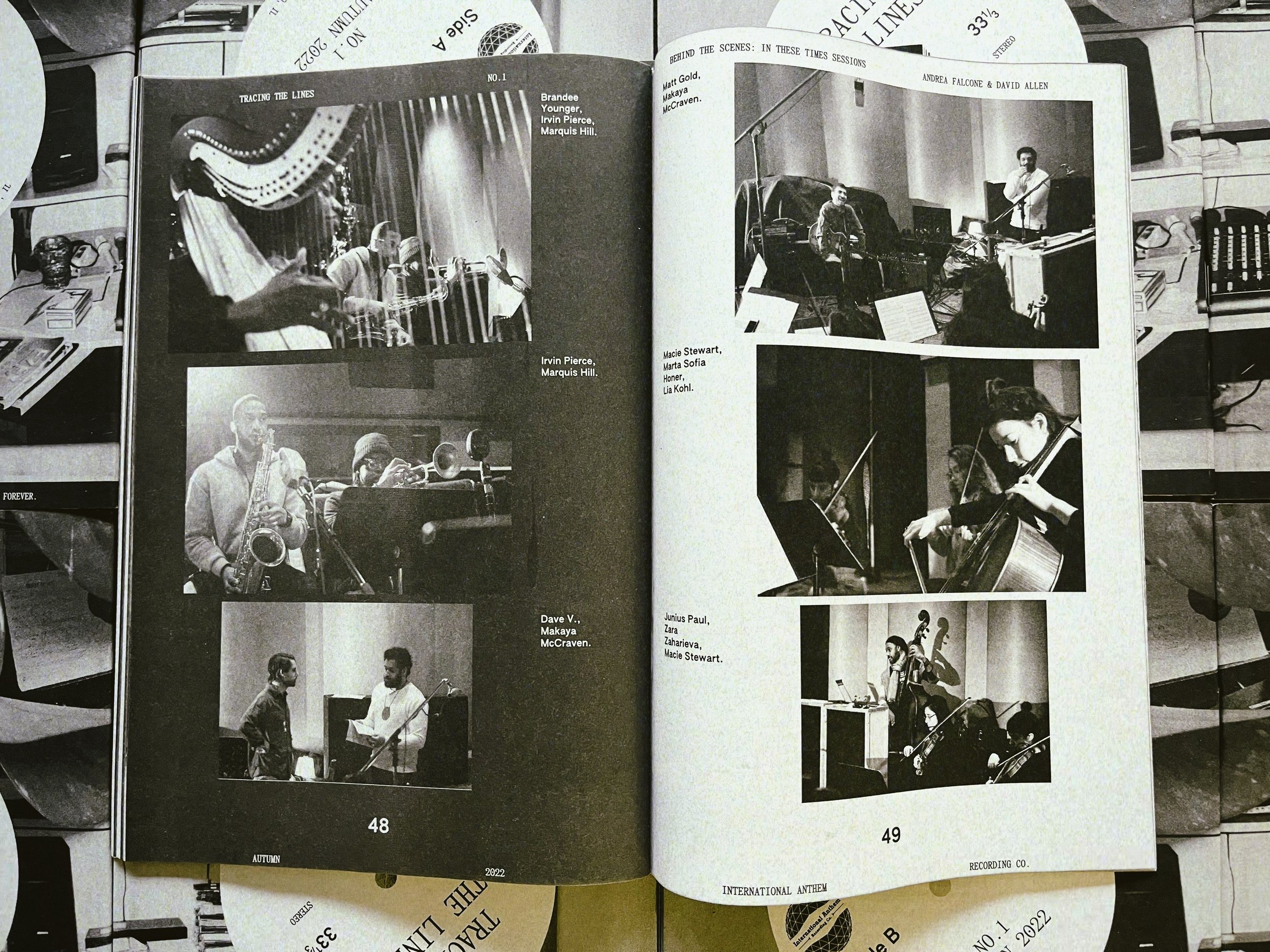
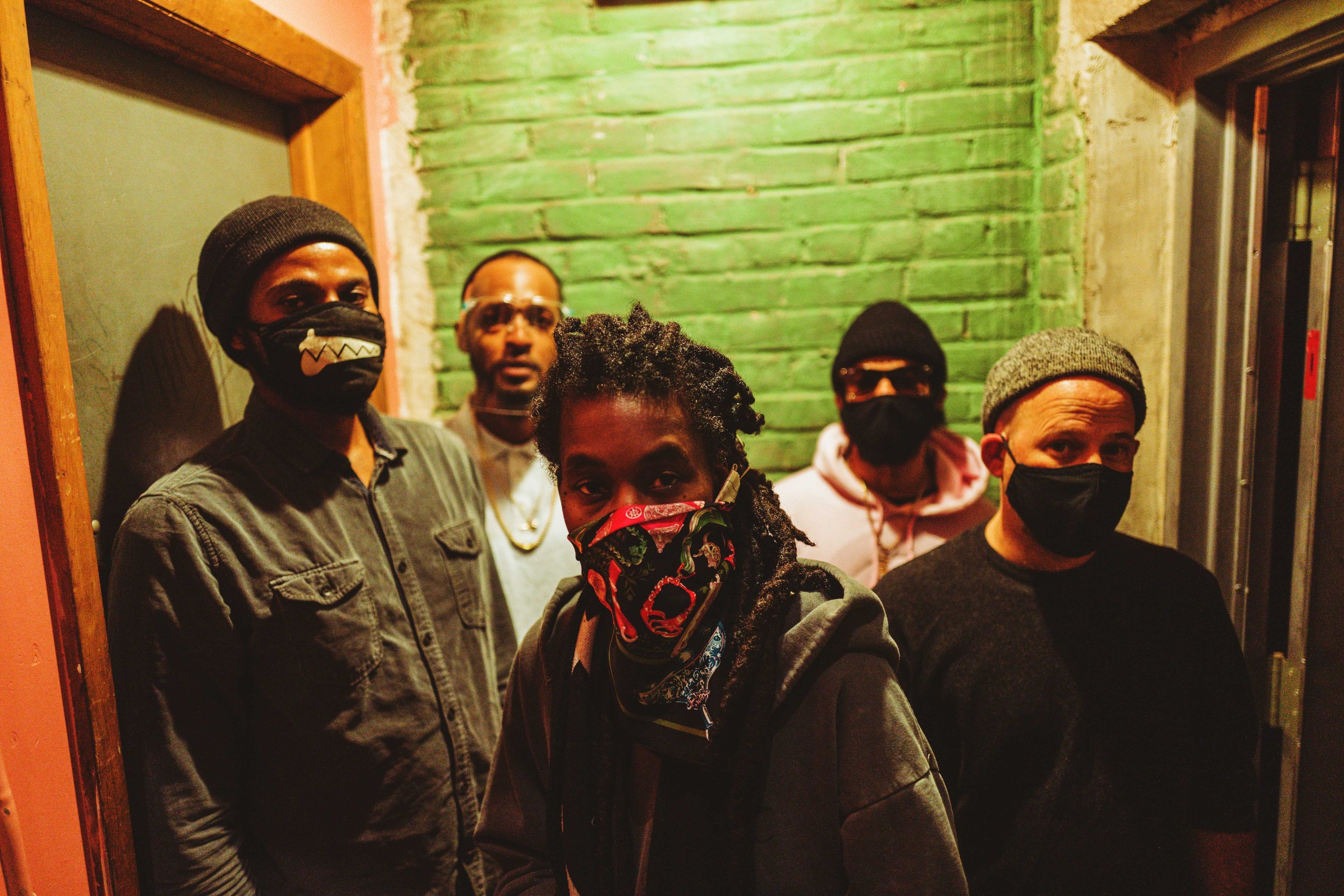
Philadelphia,
January 5th, 2021.
Just a few days after the global pandemic rolled into another year. The joy of a New Year celebration (“we’re leaving the hell of 2020 behind!!”) is already fading into sad acceptance of some hard realities. Although vaccines are starting to trickle out, we’re still in the middle of the deadliest point in the pandemic… still in the middle of the darkest, shortest days of winter… all of which meaning we’re still isolated for the most part, not able to freely gather… Many of us have already lost close ones; some of us have some very near/dear ones fighting for their lives in the ICU…
And the civic climate is dire. Not just for the sickness, the death (and/or the fear of it), or the clashes around restrictions, vaccines, access, disparity, public health in general… all bubbling in the wake of George Floyd’s murder and the subsequent countrywide uprisings that peaked six months prior to this date… But for this exact moment there’s the forefront heat of media saturation around post-election denialism, and fascist factions bringing a could-be revolution and/or civil war to our doorstep… The media is widely reporting seemingly unbelievable speculations that the inflection point could very well be the next day at the US Capitol, in an openly orchestrated coup d’etat led by the sitting president (the unbelievability being challenged by his repeated, bold-faced, fervor-inducing public comments). If you ask ten people about the state of the “union,” atleast nine of them would say society feels like it’s coming apart at the seams.
Anyways… zooming back in to Philadelphia… the members of Irreversible Entanglements (Camae Ayewa, Keir Neuringer, Aquiles Navarro, Luke Stewart, and Tcheser Holmes) are arriving at Rittenhouse Soundworks. They’re gathering in-person for only the second time since the emergency pandemic lockdown canceled the European tour they were supposed to embark on, just days before their second album Who Sent You? was released (March 20th, 2020).
From that moment in March 2020, the band had been mostly deprived of their collective expression – their radical, communal and improvisational means of self-regenerating, culture-building, world-changing sound projection – by the total shuttering of the medium of live music as we knew it. Despite the ubiquity of those restrictive constraints, all five musicians had spent months in their respective reality tunnels transcending all imposed boundaries to ensure that the music never stops its forward motion.
The gravity of everything drew the five musicians together as they chose this day, January 5th, 2021, as a summit point for a collective resistance to those forces pushing down, trying to silence their sound. Through their individual trajectories across 2020, they had developed new voices, new thoughts, and new feelings about the individual/collective experience of everything. And their goal, as with the previous two Irreversible Entanglements studio recordings, is to make an album in a single day of work. Including setup and breakdown, they have only a few hours of music-making to do just that.

Below, members of IE Luke Stewart and Keir Neuringer, as well as engineer Mike Richelle and photographer Bob Sweeney, share some words about being in that space/time, where in just three hours the band recorded all the sounds that would comprise their third album, Open The Gates.
All photographs by Bob Sweeney. Introduction by Scott McNiece. Transcripts by Brian Seyler. Design by Itzi Marques.
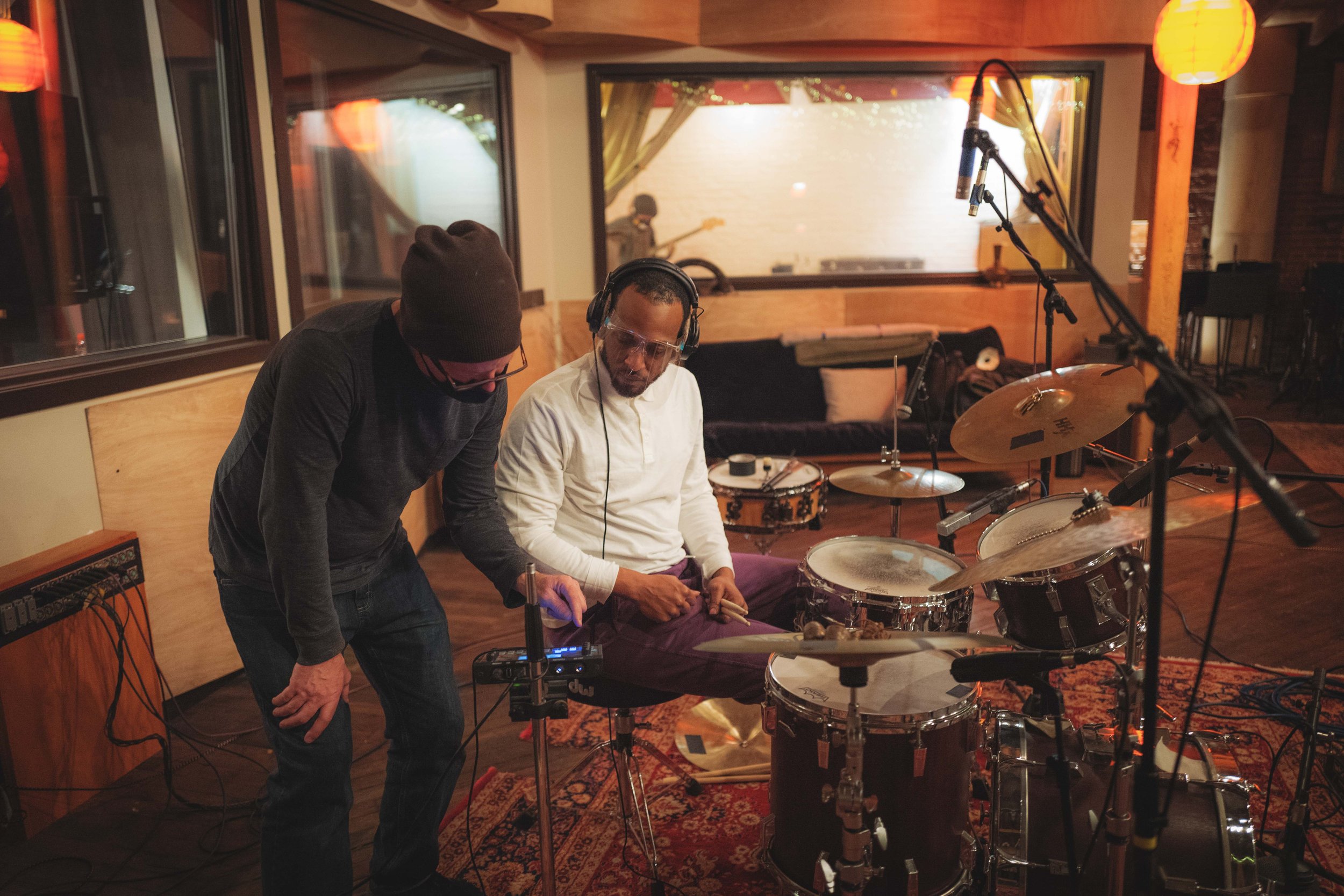
Mike Richelle: Looking at the date… it strikes a serious chord with me. I haven't thought about it too much but the backdrop for that session was a world in distress, between the pandemic at its peak and the political nonsense going on. Personally, I had close family quarantined in the hospital that I was unsure if I would see again. So there's that.
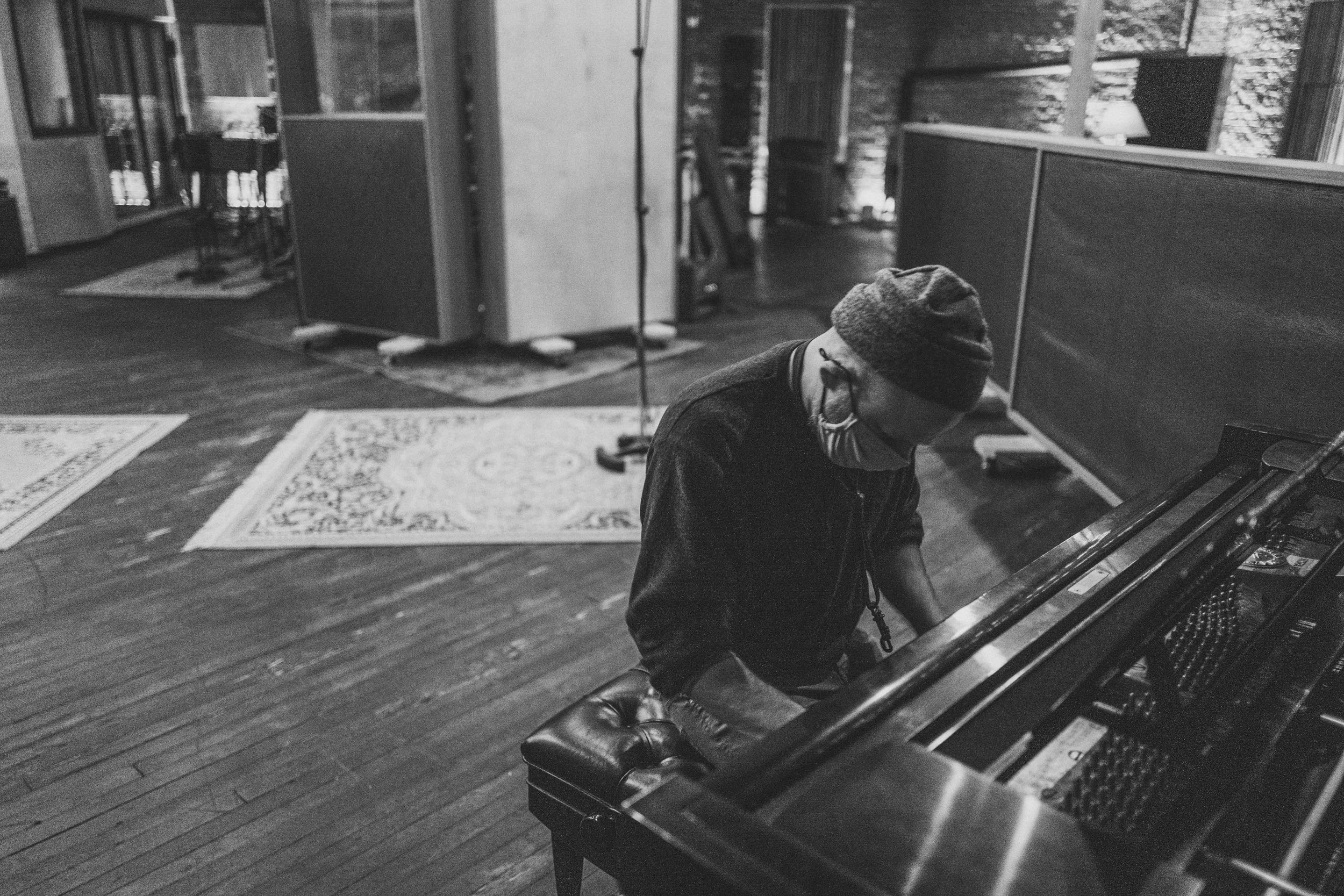
Keir Neuringer: I drove four hours from Ithaca. The roads were kinda empty, the world felt, you know… I felt isolated and far away. I hadn’t seen the band since… I think end of September. We hadn’t played together, all five of us before that, since March of 2020… right before the Who Sent You? tour that wasn’t. So it felt so good to play. It felt so necessary.
I was personally just about out of fuel psychologically and emotionally at that point. And going in I thought… well we have three hours. I thought we might just play, we might just blast for three hours, and just put it all on tape.

Bob Sweeney: I didn't know they were only recording for one night until I got there. I thought they would at least be there for 2-3 days. I had a few ideas going into the session as to what I wanted to do for photo and video, but abandoned it and just went with the flow. Everyone was so locked in. I would have loved to shoot more that night but I ran out of film!
Luke Stewart: I remember getting a cheesesteak from the spot right around the corner, and I remember it was a pretty decent one. The actual spot was like a step up from a Philly carry-out cheesesteak joint, so it maybe had been there for a little while, but it was like North-North Philly. So I was like okay cool this is a different zone of Philly that I haven’t really been to that often. Getting a cheesesteak. Chillin.
Luke: I remember we went into the spot, and it was super nice. I was impressed with the studio, just the look of it. The vibe was correct.
Keir: It felt so good to be in that room – which is a really nice recording room. It was a big spacious room, so nerves were eased about that… But the session was incredibly healing. I mean, that was the word of intention going in for us. And that’s how it felt. It felt so good to play. The world felt cold and the playing felt warm. On the record there’s a lot of water themes… The healing felt tangible. The playing felt good. The sounds felt good. The newness felt good.
Mike: The live room at Rittenhouse is really beautiful and inspiring to play in. Our way of working there is for the artist to be comfortable in their performance setup as a priority then design the technical consideration around that. The options were to have all in the live room together or put some players in iso rooms. We opted for all the players going live with 2 players ("bass" and “vocals”) in their own iso room on headphones. This plan worked out fine.

Keir: We were laid out like a star. We could all kind of see each other, but we were spread out equidistant. So my visual memory is very particular to me. No one else was seeing Luke over there, Aquiles in the same space. Luke was in a booth. Camae was in a booth across from me. Aquiles was in the same room across from me, Tcheser is in the center. It’s a very specific visual. I don’t think I’ll be in a recording session that looks like that again… on purpose. It had that uniqueness in that way. The sound was really great, but we were also using the space to have space. Because that was such a big deal at that time.
Luke: We each had ideas that we brought to the table, and we improvised a lot in the studio as well. Sort of creating, composing on the fly. What you hear is really another example of our development as a band up to that point. This was sort of the residual of that, in the sense that we were in the middle of a pandemic and the lockdown, even though for some of us we were still pretty active in music.
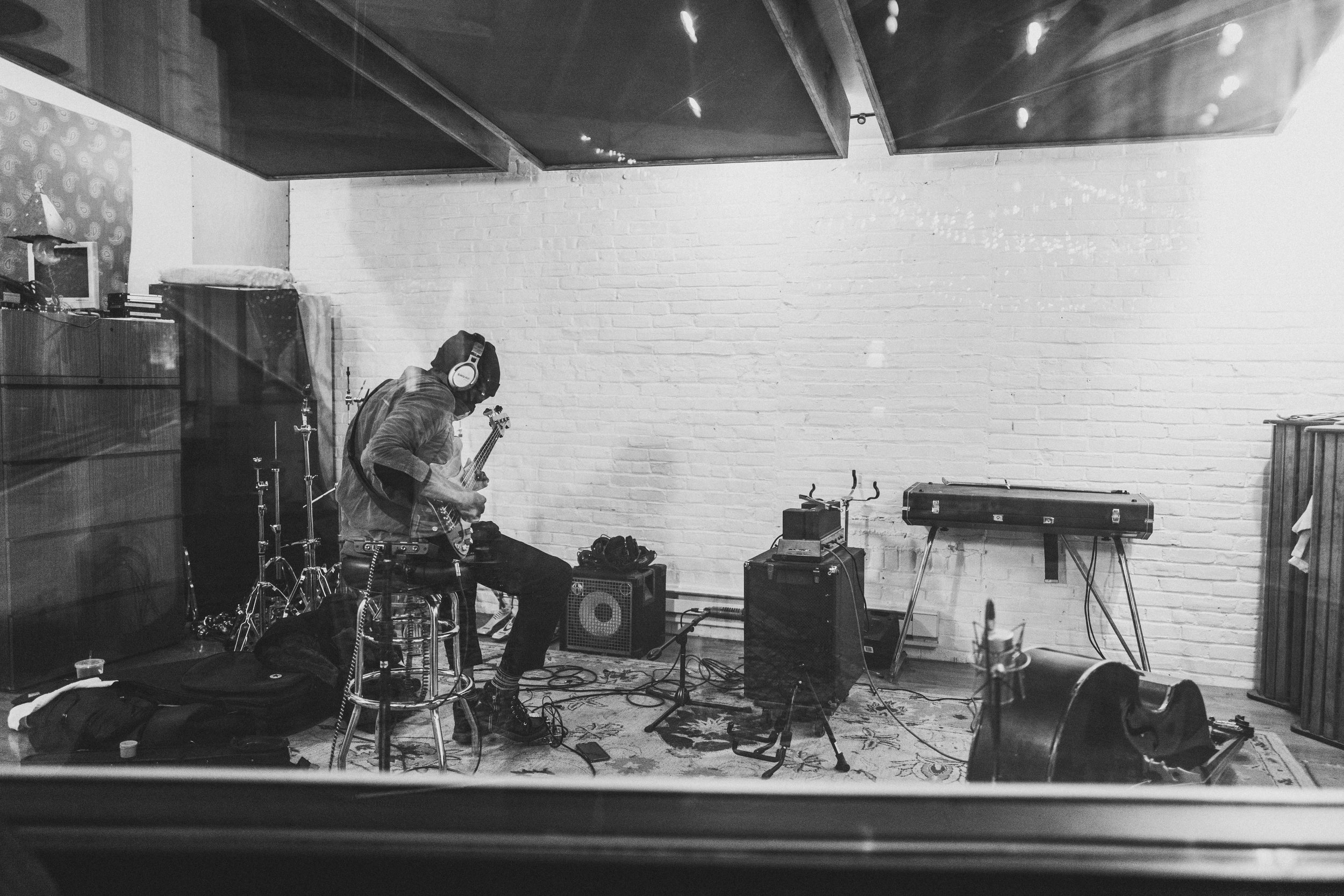
Luke: We were still active as a band – individually, musically, creatively. Even if there were things happening in our lives, as with everybody’s during that difficult time. People going through bouts of depression or you know, reconfiguring their lives to cope with the global tragedy, losing people, people dying during this time. Close loved ones passing away. But again all of that is part of the music as well. I’m thankful to have had the opportunity to be active and to have a session, such as this one, where again we can just offer that piece of healing as a unit. We offered our own understanding of coping with the tragedy, so to speak.

Mike: Musically the thing I remember most was the band's ability to move together almost instantaneously while improvising. Rhythm and emotion seemed to direct the playing. The individual players all had a very distinctive voice while moving together in an ensemble. There was a constant "what's going to happen next?" vibe to the session.
Keir: I felt like the Open The Gates session was us. It was our terms. You know? It felt really free. There were new instruments in the room. The process that everybody took to make a piece. Tcheser, the way he grabbed the idea of overdubbing percussion on the fly. Electric bass gave a new impulse… It was really special.
Luke: I remember being in the studio and we did say that it would be an important moment for there to be full-on electronics with Aquiles and Keir… and me on electric bass… and Camae doing her electronic work on top, as well as the vocals. The full electric experience. It was the moment where Irreversible went electric for the first time on record. And obviously now it’s an integral part of the show and instrumentation of the band. It was a progression from our second album to Open The Gates… it was an example of that progression, of how the music was moving.
And also I remember the production trickery, so to speak, with the layering of the drums on “Open the Gates.” That was really the first time the band constructed a song fully in the studio.
Keir: There was an incubation I feel that happened for me over the time we didn’t get together. And we pulled out new instruments and new sounds.
Maybe in my head I thought on the first record or the second record, doing that kind of thing (electric instruments) would be like… okay but this isn’t for a “free jazz” record. But we were done with that. That is a world that is over. We are free and the freedom means we can go anywhere we want. Not we have to “do free” in some idiomatic way. We were free to play inside, outside, and all around any of the ideas that were coming out. To be fully in it, and not know what’s going to happen, and not feel lost but feel free. Right?
We might not have known what was going to happen in the world, or in Washington DC the next morning. But we felt, we could all feel this shitty crystallization of a bad feeling going on in the political world. And people saying the word in this perverse way. Using the word “free” and the word “freedom” around, really, the opposite of it. And that’s why I say there was such a contradiction between what we were doing… being open, being open to one way of making things like “Water Meditation”or “Homeless/Global” (fully improvised long-form pieces), and then this new “free” to be in every part of a groove like “Keys to Creation.” And then, the way things happened making “Open the Gates” – it was like liberated thinking. It was a lot of trust, rather than a lot of what’s going on elsewhere. Which was a lot of mistrust. A lot of distrust. Falsehood. I come back to this idea of feeling really good and really empowered in that moment because it was like Luke said earlier: correct. It was correct.
Luke: Open The Gates is sort of like a foreshadowing of perhaps the times that we’re entering now. Where the music is reflective of a paradigm shift; and really the music itself is more advanced than perhaps we are as a society. Because so many people in society, you know, were locked down. But for those of us that were still plugged in… I think for a lot of us the so-called lockdown was really a time for us to really be in tune with the movement of the music at that point.
So I think that Open The Gates is a testament to how the music never stopped.And purposing it for the theme of healing, obviously during a difficult time… that’s what we needed as a band at the time, individually and collectively. It was an offering of how we can purpose our music and our feelings to inspire and showcase how the band is a special unit that is resilient in all times. As we were and are in tune with the movement of the music.

Luke: This story will mean more as time moves it on. As this moment becomes more clear in the importance of history, as things continue to unfold, this moment and this record being made in this context will become all the more important I think.

Tracing The Lines is a creative exploration of International Anthem Recording Co. and the community that surrounds it.
Issue #1
64-page 170x250mm newsprint zine, printed in CMYK on 55gsm stock, edited by David Brown and designed by Jeremiah Chiu, with contributions from Alejandro Ayala, André Baumecker, Andrea Falcone, Ayana Contreras, Azul Niño, Carlos Niño, Chris Kissel, Chuck Soo-Hoo, Damon Locks, Dave Vettraino, David Allen, David Brown, Drew Mitchell, Jeremiah Chiu, Kristie Kahns, Lindsey Stepney, Lori Mendoza, Marta Sofia Honer, Scott McNiece, Sulyiman, and Tom Skinner. Made in UK.































